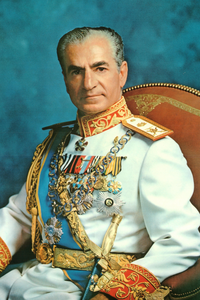This is an old revision of this page, as edited by Paul Barlow (talk | contribs) at 15:27, 2 September 2010 (→Persia: cut - speculation). The present address (URL) is a permanent link to this revision, which may differ significantly from the current revision.
Revision as of 15:27, 2 September 2010 by Paul Barlow (talk | contribs) (→Persia: cut - speculation)(diff) ← Previous revision | Latest revision (diff) | Newer revision → (diff) This article is about the monarchic or divine title. For other uses, see King of Kings (disambiguation).| This article does not cite any sources. Please help improve this article by adding citations to reliable sources. Unsourced material may be challenged and removed. Find sources: "King of Kings" – news · newspapers · books · scholar · JSTOR (September 2009) (Learn how and when to remove this message) |
King of Kings is a title that has been used by several monarchies and empires throughout history. The title is most associated with the Persian Achaemenid Empire, in which it referred to the monarch ruling over other monarchs who had a vassal, tributary or protectorate position. It is broadly the equivalent of the later title Emperor. The Persian title of a "king of kings" is 'Shahenshah'. In Christianity, it is one of the titles of Jesus.
Its equivalent in India is Mahārāja/Mahārājah/Mahāraj. Mahā = Great/High, Rāja/Rājah = King. Other regional/ethnic Indian equivalents of the term are 'Chhatrapati', 'Chakravarty', 'Mahārāna', 'Samrāʈ', etc.
Persia

The first written record of its consistent use dates to Iranian Kings of the Persian Empire (pronounced Shahanshah) due to the fact that the Persian kings ruled in a format of having other kings below them ruling provinces, satraps, the fact that the Persian kings rules over other kings gave them the title king of king. But it is commonly accepted that the Persians wrote this with an implicit notion of relation to a deity, and later with an overt spiritual connotation in the latter Persian empire of the Priest-Kings of the Sassanian Persian Empire.
The title shahanshah was revived by the Pahlavi dynasty of Persia in the 20th century.
Roman Empire
A notable use of term King of Kings comes from Donations of Alexandria ceremony in 34BC, where Caesarion, son of Julius Caesar and Cleopatra VII, were proclaimed as King of Kings, also as a status of god and son of god.
Religious
- In Judaism, "King of Kings" - in Hebrew Melech ha-M'lachim - is an expression that refers to God, whose name may not be said. It is usually rendered as Melech Malchei Ha-M'lachim (King of Kings of Kings), to put it one step above the title by which Babylonian and Persian kings are referred to in the Bible (specifically in the Book of Daniel).

- Jesus Christ is termed King of Kings in the Bible, particularly in the Book of Revelation, 17:14 and 19:16. Jesus says in the Book of Matthew, verse 28:18, that all authority on earth has been given to him. In John 18:36 he says that his realm is not of this earth (Hebrew: olam hazeh, "this world, or age", in contrast with the olam haba, "the world to come", in which he will rule), a messianistic tradition within the Jewish faith, founded its Zionist ambitions of political independence from Rome (see Sicarii, while Christ preached a spiritual 'kingdom' instead) on its version that the Messiah would (re)establish the promised land of Israel as a mighty temporal kingdom; in Christianity, it is rather God the Father who thrones in heaven as ultimate ruler of the universe, high above all mortal monarchs. In this sense, "Lord of Lords" is a synonymous title of the Lord, as used by the Church Fathers, e.g. Against Heresies, V.26 (St. Irenaeus).
- In Islam, the term "King of Kings" for another human being is prohibited. Narrated in Sahih Bukhari and Muslim, from Abu Hurairah that the Islamic Prophet Muhammed said, "Verily, the worst title is 'King of Kings'; there is no King that has absolute power except Allah". This term is prohibited as there is a similar comparison between the created being and his Creator. This prohibition serve the purpose to glorify Allah alone. The absolute use (the definite article is thus obligatory) of al-Malik, as #4 of the 99 known names of Allah, "The King", taken to imply 'The Sovereign Lord, The One with the complete Dominion, the One Whose Dominion is clear from imperfection' singles the only god out as supreme ruler over all earthly powers; another of these attributes, #84, is Malik Al-Mulk "King of the Realm", taken to mean 'The Eternal Owner of Sovereignty, The One who controls the Dominion and gives dominion to whoever He willed'.
- Buddha is referred to as "King of Kings" in the Pali Tripitaka.
- Selivanov, the co-founder of the Skoptsi, a Russian Christian sect which practiced sexual mutilation, who proclaimed himself the Son of God incarnate in the person of Emperor Peter III, claimed the titles "King of Kings" and even "God of Gods".
- Haile Selassie I, the Ethiopian Emperor was known as the "King of Kings, Lord of Lords, and the conquering Lion of the Tribe of Judah" and based on these titles and their biblical reference is seen as God amongst the members of the Rastafari movement.
See also
References
- Meyer Reinhold, Studies in classical history and society, Oxford University Press US, 2002, p.58.
 This article incorporates text from a publication now in the public domain: Chisholm, Hugh, ed. (1911). Encyclopædia Britannica (11th ed.). Cambridge University Press.
This article incorporates text from a publication now in the public domain: Chisholm, Hugh, ed. (1911). Encyclopædia Britannica (11th ed.). Cambridge University Press. {{cite encyclopedia}}: Missing or empty|title=(help)